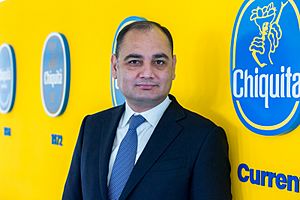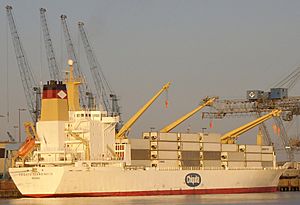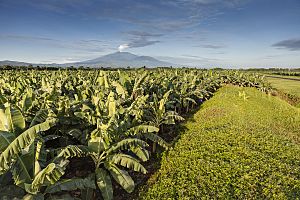Chiquita facts for kids
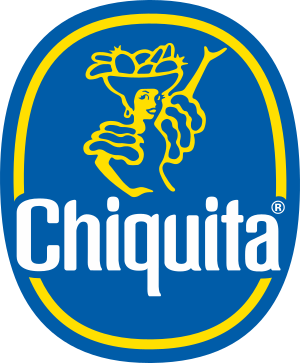
Chiquita's logo
|
|
| Private | |
| Industry | Agriculture |
| Predecessor | United Brands |
| Founded | August 1984 (as Chiquita Brands International) |
| Headquarters | Étoy, Switzerland |
|
Key people
|
Carlos López Flores (president) |
| Products | Produce (primarily bananas) |
| Owner | Cutrale (50%) Safra (50%) |
|
Number of employees
|
~20,000 |
Chiquita Brands International S.à.r.l. is a company from Switzerland. It is famous for growing and selling bananas and other fresh foods. You might know their main brand, Chiquita, or their Fresh Express salads. Chiquita is one of the biggest sellers of bananas in the United States.
The company used to be called the United Fruit Company. Over the years, it has changed owners and grown by buying other companies. For example, in 2003, Chiquita bought a German food company called Atlanta AG. In 2005, they also bought Fresh Express salads. Chiquita's main offices used to be in Charlotte, North Carolina, in the United States.
Contents
The Story of Chiquita Bananas
The history of Chiquita Brands International began a long time ago, in 1870. A ship captain named Lorenzo Dow Baker bought 160 bunches of bananas in Jamaica. He then sold them in Jersey City, USA, just eleven days later. This showed how popular bananas could become!
A few years later, in 1873, a railroad builder named Minor C. Keith started growing bananas in Costa Rica. He planted them next to his railroad tracks to help make money for the railway. In 1878, Captain Baker teamed up with Andrew Preston to create the Boston Fruit Company.
From Boston Fruit to United Fruit
The United Fruit Company was formed in 1899. This happened when the Boston Fruit Company joined with other fruit-selling businesses. In 1903, United Fruit Company became a public company, meaning its shares could be bought and sold on the New York Stock Exchange.
That same year, it became the first company to use refrigerators on ships to keep fruit fresh during long ocean trips. During this time, the United Fruit Company became very powerful in Central American countries.
In 1928, workers on the company's banana farms in Ciénaga, Colombia, went on strike. They were protesting against low pay and poor working conditions. The Colombian government sent its military to stop the strike, which led to many deaths. This sad event is known as the Banana Massacre.
United Fruit Company also used clever advertising. They had a cruise ship called "The Great White Fleet" that took American tourists to countries where they had farms. These trips made the places seem exciting and fun. However, these trips often hid the difficult lives of the workers on the banana farms. By 1930, the company had 95 ships!
The Chiquita Banana Song
In 1944, the company introduced the famous "Chiquita Banana" song. This catchy calypso tune taught people how to eat and store bananas. The song started with the words "I'm Chiquita Banana, and I've come to say." The name Chiquita became a registered trademark in 1947.
In the 1950s, the government of Guatemala started taking unused United Fruit Company land to give to farmers who didn't have any. The company asked the U.S. government to get involved. In 1954, the U.S. Central Intelligence Agency helped to remove the elected government of Guatemala and put a military leader in charge.
By 1955, United Fruit Company was handling a huge amount of fruit, about 1.2 billion kilograms (2.7 billion pounds) every year. In 1966, the company started selling bananas in Europe.
Becoming United Brands
In 1970, United Fruit Company joined with another company called AMK Corporation. They changed their name to United Brands Company. In 1980, Chiquita was a sponsor for the 1980 Winter Olympics in Lake Placid, New York.
In 1984, a businessman named Carl Lindner Jr. became the main owner of United Brands.
Chiquita Brands International Today
In 1990, the company changed its name again to Chiquita Brands International. They invested a lot in Costa Rica. However, they faced problems in Honduras. This led to what some called "Banana Wars" with a rival company, Fyffes, over banana supplies.
In 1993, new rules in Europe made it harder to import bananas from Latin America. But in 1994, some Chiquita farms were certified as being good for the environment by the Rainforest Alliance. In 1998, the world's largest banana processing center opened in Costa Rica. By 2001, the European rules that caused banana disputes were removed.
Changes and New Ownership
In 2001, Chiquita went through a process to reorganize the company. It came out of this process in March 2002. In 2003, Chiquita bought a German company that distributes produce, called Atlanta AG. They also sold their processed foods part of the business.
In 2004, all of Chiquita's farms were certified for good labor standards. In 2005, they bought Fresh Express salads.
In 2014, Chiquita Brands International and Fyffes, another fruit company, announced they planned to merge. This would have created the biggest banana company in the world. However, two other companies, Cutrale of Brazil and Safra Group, made a higher offer to buy Chiquita. Chiquita's shareholders decided to accept the offer from Cutrale and Safra.
How Chiquita Works
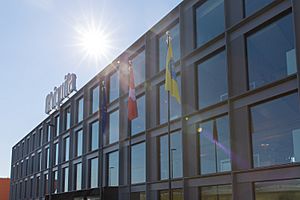
Chiquita Brands International works in 70 countries around the world. As of 2018, about 20,000 people work for the company. They sell many fresh foods, like bananas, ready-made salads, and healthy snacks. Their Fresh Express brand alone sells about $1 billion worth of salads each year in the United States.
In 2011, Chiquita decided to move its main offices to Charlotte, North Carolina. They chose Charlotte because of its growing airport and other benefits. However, by 2019, the company's main offices moved out of the United States and are now located in Switzerland.
The Chiquita Logo
The famous "Miss Chiquita" character was created in 1944 by Dik Browne. He is also known for drawing the comic strips Hi and Lois and Hägar the Horrible. Miss Chiquita first appeared as a cartoon banana with a woman's body, like the singer Carmen Miranda.
Different singers gave Miss Chiquita her voice over the years, including Patti Clayton and June Valli. The advertisements showed the banana character wearing a fruit hat. In 1987, Miss Chiquita changed from a banana with a body to a woman. A new design for Miss Chiquita was shown in 1998.
You might have seen the peel-off stickers with the Chiquita logo on bananas. These stickers started being used in 1963. They are still put on bananas by hand today so that the fruit doesn't get bruised.
More to Explore
See also
 In Spanish: Chiquita Brands International para niños
In Spanish: Chiquita Brands International para niños
 | Frances Mary Albrier |
 | Whitney Young |
 | Muhammad Ali |


